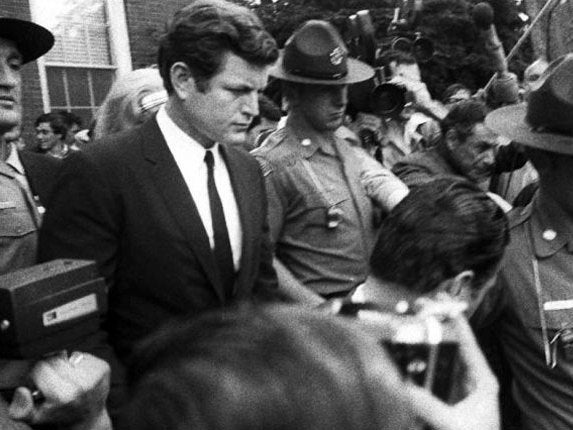Kennedy memoir reveals his remorse over scandal
Posthumous account of Chappaquiddick accident talks of Kennedy's 'terrible decisions'

In a posthumous memoir to be published this month, Edward Kennedy frankly acknowledges the personal failings that probably kept him from the presidency – above all his "inexcusable" behaviour over the July 1969 accident at Chappaquiddick which, he says, may have hastened the death of his father, Joe Senior, the patriarch of the family dynasty, later that year.
For the first time, the long-time senator and youngest of Joseph's four sons recounts how he made "terrible decisions" in the hours after Mary Jo Kopechne, a young worker on his brother Robert's 1968 presidential campaign, was trapped and drowned when the car he was driving went off a bridge on Chappaquiddick Island in Massachusetts.
Frightened and confused, Mr Kennedy made the fateful decision not to go to the police until Ms Kopechne's body was found the next day. Ultimately, he received a suspended sentence for failing to report an accident. Most important, however, the affair added to the doubts about his character, making it impossible for him to seek the White House in either 1972 or 1976. It also helped doom his candidacy when he finally did run for the Democratic nomination – against the sitting president Jimmy Carter, who would go on to lose heavily to Ronald Reagan in 1980.
True Compass had originally been intended to appear in 2010, to mark the 50th anniversary of his brother Jack's election to the White House, but was moved up to this autumn after Mr Kennedy was stricken with fatal brain cancer in early 2008. A copy was obtained by The New York Times, which published the first extracts yesterday.
More perhaps than its discussion of the senator's drinking and carousing, the 532-page book is striking for its insights into the complicated personal relationships within a fiercely competitive family: how he was tormented by a feeling of inadequacy when compared to his three brothers, all of them dead by the time Ted Kennedy reached his late thirties. "As I think back about what they had accomplished before I was even out of my childhood," he writes, "it sometimes has occurred to me that my entire life has been a constant state of catching up."
The brothers, he says, were close, but at the same time curiously distant. Ted, for instance, "had no idea how serious Jack's health problems were," for the simple reason that "it would never have occurred to us to discuss such private things with each other".
If anything, the assassination of Robert Kennedy in 1968 was even more traumatic for the youngest Kennedy than that of the 35th president five years before. The loss led to more "self-destructive" drinking, and made it impossible for Ted to return to the Senate. Instead, he went for long sailing trips, brooding about what had happened.
He admits his conduct drove his wife, Joan, who would have drinking problems of her own, "deeper into her anguish". The couple divorced in 1982. Mr Kennedy himself "tried to stay ahead of the darkness" by driving himself and his senate staff especially hard. But the assassinations left their mark on his daily life. He writes of how he would flinch at sudden sharp noises, and even fling himself to the ground when a car backfired.
True Compass, written with a collaborator, Ron Powers, is largely based on contemporaneous notes taken by Mr Kennedy over five decades, and recordings for an oral history project. Alongside his failings, it also displays his resilience, even when confronted by cancer when doctors gave him mere months to live. In the event, he survived a year and a half. "Approaching adversity with a positive attitude at least gives you a chance for success," Mr Kennedy writes. "A defeatist's attitude is just not in my DNA."
Join our commenting forum
Join thought-provoking conversations, follow other Independent readers and see their replies
Comments
Bookmark popover
Removed from bookmarks